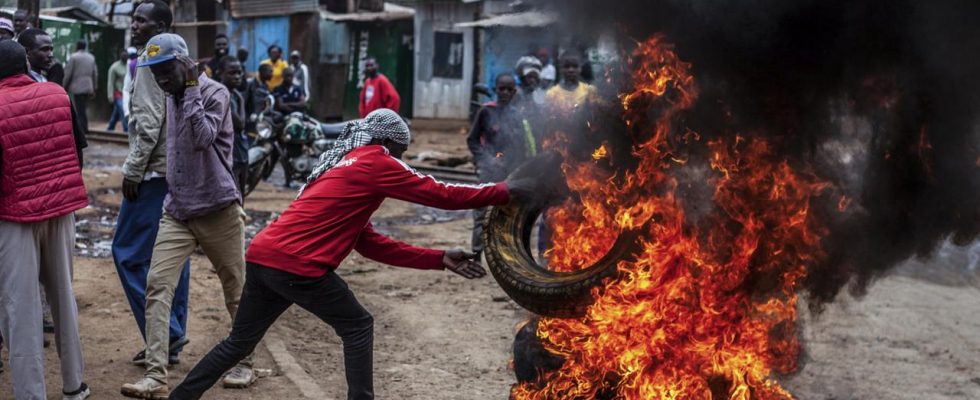Basic foods such as flour for maize porridge have become so expensive in Kenya that many families have to cut back. The need drives people onto the streets, and the protests increasingly turn into violence.
Hundreds of people march through a quarter of the Kenyan capital Nairobi. “Tumechoka” they call, “we are tired”. It is the prices that have been rising for months that they are tired of and that are driving them onto the streets.
Opposition leader Raila Odinga and other politicians from his camp have called for the protests. They are leading the protests. But many of those demonstrating here no longer need encouragement to take to the streets.
“We’re not here because of Raila Odinga,” says a man from the suburbs. “The Kenyans are defending themselves against the increased taxes.”
Do new taxes seep away in the swamp of corruption?
President William Ruto, who has been in office for almost a year, has announced various new taxes and has already obtained parliamentary approval for them. Officially, the new taxes should help to restructure the completely ailing national budget.
But many do not trust the government. Politicians allied with Ruto were already involved in corruption scandals during his time as Vice President. The fear is that money that goes to the government through the new taxes seeps away down dark channels.
Actually, the new taxes should have been in effect since July 1st. But the highest court in Kenya still has to decide on the legality after objections. However, the fuel prices at the gas stations have already risen, and so have all other prices due to the higher transport costs.
Drought and higher grain prices
The new increases hit people in an already desolate situation. By the time it started raining a few weeks ago, all of East Africa had been going through a long drought, the worst in four decades. Crops withered and livestock perished. At the same time, grain prices rose worldwide as a result of the war against Ukraine.
As a result, Kenyans paid significantly more for everything even before the new price increases. A study by a market research institute recently showed that 65 percent more had to be paid for cornmeal as a staple food than a year ago. The sugar prices rose accordingly by 50 percent.
Leah Akinyi, one of the protesters in Nairobi, complains that instead of helping the people, the politicians are making the situation worse. Ruto promised a lot, but life had become too hard. Akinyi says she can’t even send her children to school because she can’t afford the fees.
The protests escalate
The protests have recently become increasingly violent in Nairobi and other parts of the country. Demonstrators threw stones at emergency services. The police used tear gas, especially in the slums.
A school was also recently affected. Around 50 children had to be taken to hospital after inhaling the gas. Some fell unconscious.
There are different reports on the number of dead and injured. But in the capital alone, around a dozen people are said to have been shot dead by security forces.
Demonstrations against the Kenyan government are not only taking place in the capital, Nairobi. Again and again there are violent clashes between demonstrators and the police.
The feeling of having nothing left to lose
Many are driven onto the streets with the feeling that they have nothing left to lose. Unemployment in the country is high. According to estimates, around 80 percent of people are employed in the so-called informal sector. That means they work as day laborers and fight again and again to secure a short-term job and earn some money.
But even those who previously counted themselves part of the middle class often no longer have enough to feed their families.
Aid packages from the province
A few transport companies are among the few to benefit from the crisis. Heavily laden buses are now arriving in central Nairobi every day. They bring food parcels from the agricultural regions in Kenya.
Willis Omondi, who works for one of the bus companies, explains that these are private deliveries that concerned relatives want to use to support their relatives in the much more expensive capital. “Basically, people are now dependent on food from the villages.”
So far, they have transported around 10,000 packages a day. Now there are twice as many.
Further protests foreseeable
Bananas, corn, beans – what is now growing in the fields again after the drought is sent to Nairobi. But even that brings her little relief, says Valerie Achieng, a mother of four, who picks up a bag from the arrivals hall. At the moment it is only enough for her for two meals a day, for breakfast and dinner. Lunch must be canceled for everyone.
Some can only afford one real meal – and demonstrate with hungry stomachs. “A day of chaos and death,” headlined Kenya’s largest newspaper after the recent protests. It is already foreseeable that there will be more. Anger in Kenya rises with the prices.

